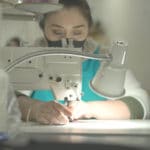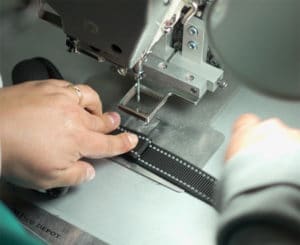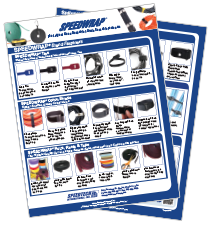Top 5 differences between sewing vs ‘industrial’ sewing.

Quality Sewing@TFI Custom Fabrication
With our acquisition of TFI Custom Fabrication, Speedtech can leverage TFI’s 35 years of industrial sewing expertise for you, our customer.
Let’s take a look at the differences between regular vs INDUSTRIAL sewing.
Machinery for Industrial Sewing
#1 Domestic/Home Sewing Machines are designed to handle lighter materials like thin fabric, clothing and other things that might need repairing or producing at home. These light-duty sewing machines usually come with up to 100 stitch options.
Industrial Sewing Machines are used for thicker, heavy-duty materials and run throughout the day in an industrial environment. They’re typically used to sew materials such as leather, canvas, multiple layers of webbing, neoprene. Etc. They use a single stitch option to place less wear on the material. Industrial sewing machines also provide a much higher quality of stitching.
At TFI, we use our industrial sewing machinery with neoprene, nylon and other webbing, VELCRO® Brand Fasteners, other hook & loop materials and textiles.
#2 Domestic machines are designed to be used for a couple of hours at a time, and the user is able to stop and start a project easily. The quality of sewing however can be adversely affected by changes in thread or material.
Industrial machines are designed for a more heavy-duty workload; being able to run for longer hours and deal with more intense projects than a domestic machine.
#3 Domestic machines have small, compact motors, capable of pushing the machine through shorter tasks with minimal speed. They require very little maintenance and are easily serviced.
Industrial machines have huge motors to power the machine for long periods of time and are made to operate at fast speeds to increase production. Unlike Domestic machines however, their functionality relies heavily on maintenance and must be cleaned and oiled often.
#4 Domestic machines are usually used by hobbyists, and only cost a few hundred dollars.
Industrial machines are used by businesses and substantially more expensive. Serious sewers are willing to invest in these industrial machines because they are faster, more efficient, and produce higher quality product.

Operation and Sewing Expertise: An ‘Art’ not a ‘Science!’
#5 You need a skilled operator with industrial sewing.
A machine is only as good as it’s operator. If an operator doesn’t set up the machine properly, the finished product will reflect that. The process of industrial sewing requires attention and skills that are developed over time.
David Deavenport of TFI Custom Fabrication explains, “You might think that a skilled sewing operator is measured by his/her output and how many ‘widgets’ they can sew in a given amount of time. While speed is part of the calculus, quality sewing is dependent upon the operator more than the machinery. And for our customers, quality is typically why they came to us in the first place.”
Don’t put your sewn product or supply chain at risk!
With our acquisition of TFI Custom Fabrication, Speedtech can leverage TFI’s 35 years of industrial sewing expertise for you, our customer. TFI employs a highly skilled team of sewing experts, some of whom are 3rd generation sewers!
If you’re looking for a quality industrial sewing supplier, contract supplier or feel it’s time to re-shore your sewn fasteners, contact us today.

